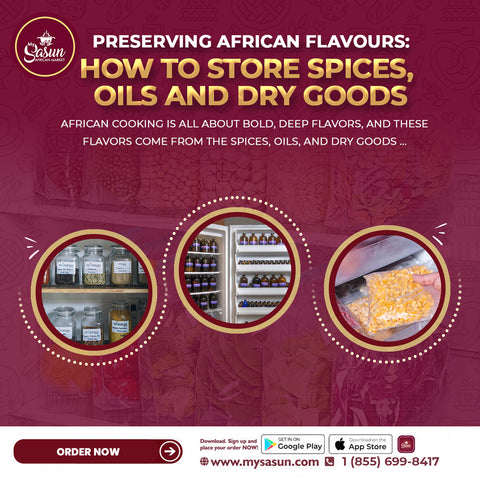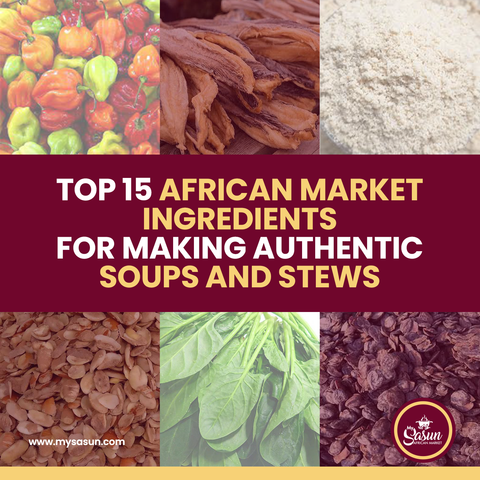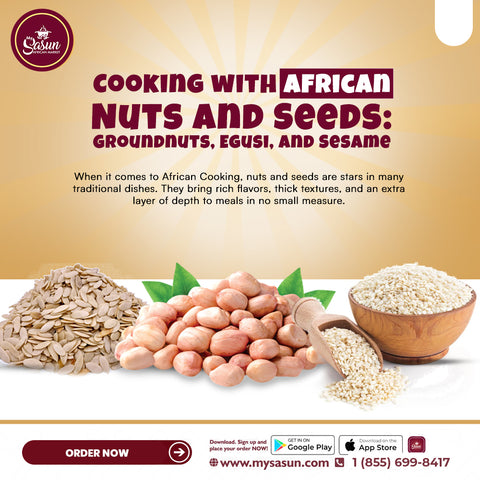African cooking is all about bold, deep flavors, and these flavors come from the spices, oils, and dry goods which are the staples that form so many beloved African dishes. But as anyone who cooks regularly knows, keeping these ingredients fresh and potent requires proper storage. The rich palm oil in your Banga Soup; the ground crayfish for your Egusi, or the dried pepper that gives your stews their fiery kick need the proper storage if you’ll want to make sure they last and taste their best each time.
So, how do you keep these key ingredients fresh while preserving their rich flavors? Let’s dive into the best ways to store your African spices, oils, and dry goods, so you can bring out the most authentic taste in every dish.
Also Read: 30 Staples of African Kitchens

Why Proper Storage Matters
In African cooking, the quality and freshness of your ingredients make a huge difference. Old, stale spices can leave your dishes tasting flat, and improperly stored oils can spoil quickly, affecting both the flavor and safety of your meals. When properly stored however, your spices stay aromatic, your oils stay fresh, and your dry goods—like rice, beans, and flour—remain in good condition for months. Proper storage ensures that each meal bursts with flavor, just as it’s meant to.
Also Read: A Comprehensive Guide to 7 Types of Cooking Oils
How to Store Spices
Spices are the soul of African cooking. From ground pepper to cloves and thyme, these small but mighty ingredients are utmostly important. But to keep them at their best, you need to store them right.
1. Keep Spices in Airtight Containers
Air is the enemy of spices. Once exposed to oxygen, the oils in the spices start to break down, leading to loss of flavor and potency. For best results, store your ground spices and whole spices in airtight containers. Glass jars with tight-fitting lids or resealable plastic bags work great for this.
2. Store in a Cool, Dark Place
Spices are sensitive to heat, light, and humidity. Keep them in a cool, dry place, away from direct sunlight and your stove. A pantry or cupboard is ideal. This helps preserve their natural oils and keeps them flavorful for longer.
Also Read: 30 Common Nigerian Spices And Their Uses| My Sasun African Market

3. Buy Whole Spices When Possible
Whole spices, like cloves, cinnamon sticks, and black pepper, last longer than ground ones. If possible, buy whole spices and grind them as needed. This ensures the freshest flavor and helps you get more life out of your spices.

4. Label and Date Your Spices
Spices don’t last forever. Ground spices typically stay fresh for about 6 months to a year, while whole spices can last up to 2-3 years. Always label your spices with the date of purchase, so you know when it’s time to refresh your stock.

How to Store Oils
Oils, especially the ones commonly used in African cooking—palm oil, vegetable oil, and coconut oil—are key to getting that authentic flavor. But improper storage can lead to rancid oils, which can ruin a dish in seconds.
1. Store Palm Oil in a Cool, Dark Place
Palm oil is a staple in West African cooking, but it’s sensitive to heat and light. To keep it fresh, store it in a cool, dark place, such as a pantry or cupboard. You can store unopened bottles for up to a year, but once opened, it’s best used within 3-6 months. If you live in a warm climate, you may even want to refrigerate your palm oil to extend its shelf life.
2. Keep Coconut and Vegetable Oils Sealed
For coconut and vegetable oils, tightly sealed bottles are your best friend. Like palm oil, store them in a cool, dark place to prevent them from going rancid. If you’ve opened the bottle, try to use it within 6-12 months for the best flavor.
3. Refrigerate for Longer Shelf Life
Oils like coconut oil and palm oil can harden in the fridge, but they’ll last longer if stored there. If you decide to refrigerate, just remember to take the oil out before cooking, allowing it to return to room temperature so it’s easier to use.
Also Read: EVERYTHING YOU NEED TO KNOW ABOUT PALM OIL
How to Store Dry Goods
Dry goods like grains, beans, flour, and dried fish are key in African cooking and properly stored dry goods make all the difference in both texture and taste.
1. Use Airtight Containers for Grains and Beans
Beans, rice, and other grains should be stored in airtight containers to prevent moisture and insects from getting in. Plastic or glass containers with secure lids are ideal. If stored properly in a cool, dry place, grains and beans can last for 6 months to a year, or even longer.

2. Store Flour in airtight containers
Flours, such as yam flour or cassava flour, can go rancid if not stored correctly. For long-term storage, keep flour in airtight containers. This protects it from moisture and bugs while maintaining its freshness for months.

3. Keep Dried Fish in a Sealed Bag in the Freezer
Dried fish, a staple in soups like Banga and Ogbono, can be kept in the freezer for maximum freshness. Wrap it tightly in plastic or store it in a resealable bag before freezing. Freezing dried fish helps it last up to a year without losing its smoky, intense flavor.

4. Watch Out for Humidity with Garri and Fufu Flour
Garri and fufu flour need to be kept dry to avoid clumping and mold. Store them in airtight containers in a dry, cool space. If possible, keep them in their original packaging inside a tightly sealed bag to keep moisture at bay.

Bonus Tips for Preserving African Ingredients
- Use Silica Gel Packs for Extra Freshness: If you live in a humid area, toss a food-safe silica gel packet into your containers to absorb moisture and keep your spices and dry goods fresh.

- Buy in Small Quantities: If you’re not using certain spices or oils regularly, buy smaller amounts. This way, you won’t have to worry about them losing flavor before you can finish them.

- Vacuum-Seal for Longevity: For dry goods like grains and beans, vacuum-sealing can extend their shelf life by reducing air exposure. This method works especially well if you’re buying in bulk.

Rounding Off
African cooking is all about flavor, and those flavors start with fresh, well-preserved ingredients. By taking a little extra care with how you store your spices, oils, and dry goods, you can make sure your favorite dishes always taste their best. If you’re simmering a rich pot of Egusi Soup or frying up some plantains, using high-quality, well-stored ingredients makes all the difference.
At My Sasun African Market, we offer everything you need to bring authentic African flavors into your kitchen. And now, with these storage tips, you can ensure that every meal is as vibrant and delicious as the last!
FAQs
How long do ground spices last?
Ground spices typically stay fresh for about 6 months to a year, depending on how well they are stored. Whole spices last longer—about 2 to 3 years.
Should I refrigerate my palm oil?
While palm oil doesn’t need to be refrigerated, doing so in warm climates can extend its shelf life. Just be sure to bring it to room temperature before cooking.
Can I store beans and grains in their original packaging?
It’s better to transfer beans and grains to airtight containers after opening to keep them fresh and prevent moisture and insects from getting in.
How should I store dried crayfish or dried fish?
Dried fish and crayfish should be kept in sealed bags in the freezer to maintain their flavor and texture for longer periods, up to a year.
Can I freeze flour like yam flour or cassava flour?
Yes, storing flour in the freezer can extend its shelf life and keep it fresh. Just make sure it's in an airtight container to prevent freezer burn.







Comments (16)
At first i never thought it will happen until i gave it a try, because i have been hearing people saying it and my life has been like a hell in a cell having this herpes virus in my body. thank you so much for your unwavering dedication, and life-changing impact on my health. Your holistic approach to healing not only cured my herpes virus but also restored my faith in the power of natural medicine. Your personalized care, deep knowledge of herbal remedies, and compassionate guidance have been nothing short of miraculous in my healing journey.
Your commitment to providing effective and sustainable solutions goes above and beyond expectations. The way you attentively listened to my concerns, meticulously crafted a treatment plan, and continuously supported me through every step of the process has truly transformed my life. Your healing hands and compassionate heart have made a lasting impression on me, leaving me forever grateful for the positive changes you have brought into my life. Today i will like to use this medium to say a big THANK YOU and also recommend him to everyone suffering from HERPES, HEPATITIS, CANCER, KIDNEY FAILURE, BARRENESS, HIV AIDS, HSV1, HSV2, WEAK ERECTION, LOW SPERM COUNT, LUPUS, SKIN CANCER you can reach him on his Email: drkuriamaherbalhome@gmail.com
WhatsApp: +2349069653609
website https://onetouchkuriamaherbal.weebly.com
I have been suffering from Herpes for the past 1 years and 8 months, and ever since then i have been taking series of treatment but there was no improvement until i came across testimonies of Dr. UMA on how he has been curing different people from different diseases all over the world, then i contacted him as well. After our conversation he sent me the medicine which i took according .to his instructions. When i was done taking the herbal medicine i went for a medical checkup and to my greatest surprise i was cured from Herpes. My heart is so filled with joy. If you are suffering from Herpes or any other disease you can contact Dr. UMA today on this Email address: dr.umaherbalcenter@gmail.com or whatsapp +2347035619585.
Get rid of all kinds of Herpes and virus infections, Diabetes, Hepatitis A B C, Menopause and HIV with Natural Roots and Herbs, i was once infected with HERPES and after using Dr UMA Herbal Medicine for couple of weeks i couldn’t trace it anymore, i even went for checkup and my test came out Negative. Get your cure today from this wonderful herbalist, Dr. UMA.
You can also reach doctor UMA on WhatsApp
+2347035619585 or Email dr.umaherbalcenter@gmail.com.
Powerful Herbal treatment is 100% guarantee for HSV cure, the reason why most people are finding it difficult to cure HSV 1 or 2 is because they believe on medical report, drugs and medical treatments which is not helpful to cure HSV and hasn’t proved any sign of helping. Natural roots/herbs are the best remedy which can easily eradicate herpes forever. I never believed it until I was helped and cured of my 16 months genital herpes with natural herbal medicines from Dr Sikies. Where other medical prescribed drugs and treatments failed, Dr Sikies natural herbs helped saved me from Genital herpes permanently and I’m so grateful for this. You can also get help from this great and powerful Herbalist Dr Sikies by reaching himon Email: drsikies@gmail.com / WhatsApp +2348163430143 website to make order now : https://drsikiesherbalcuremedicine.weebly.com/
I have been able to cure my herpes with Dr Ahonsie herbal medicine. You are free to contact him and get the cure, he uses natural herbs to prepare the cure… You can reach Dr Ahonsie on email: drahonsie00@gmail.com / WhatsApp: +2348039482367. https://drahonsie002.wixsite.com/dr-ahonsie
Powerful Herbal treatment is 100% guaranteed for HSV cure, the reason why most people are finding it difficult to cure HSV 1 or 2 is because they believe in medical reports, drugs and medical treatments which are not helpful to cure HSV and haven’t proved any sign of helping. Natural roots/herbs are the best remedy which can easily eradicate herpes forever. I never believed it until I was helped and cured of my 16 months genital herpes with natural herbal medicines from Dr Agbon. Where other medical prescribed drugs and treatments failed, Dr Agbon natural herbs helped save me from Genital herpes permanently and I’m so grateful for this. You can also get help from this great and powerful Herbalist Dr Agbon by reaching him now, WhatsApp Number :+2349058797761
Email: dragboherbalhome@gmail.com WebSite: https://dragbonherbalhome.wixsite.com/my-site-3
HOW I GOT MY HERBAL REMEDY FOR MY HERPES DISEASE
Hello, I think it is the right time for you all to know about this traditional herbal spell caster who helped me find a remedy to cure my Herpes disease. I have been a victim of herpes disease for the past 2 years. I have done everything I could to get rid of it, but it has all failed me. All thanks to Dr Isa, who came to my rescue and sent me herbal tea that I drank for 7 days, which cured me totally from suffering from my herpes disease. For those of you who need help to cure your disease should contact this traditional herbal man for help. I assure you that he will help you. WHATSAPP: +2347046030096 Contact email: drisaspellcaster@gmail.com Website: https://drisaspellcaster.wixsite.com/dr-isa
Powerful Herbal treatment is 100% guarantee for HSV cure, the reason why most people are finding it difficult to cure HSV 1 or 2 is because they believe on medical report, drugs and medical treatments which is not helpful to cure HSV and hasn’t proved any sign of helping. Natural roots/herbs are the best remedy which can easily eradicate herpes forever. I never believed it until I was helped and cured of my 16 months genital herpes with natural herbal medicines from Dr Sikies. Where other medical prescribed drugs and treatments failed, Dr Sikies natural herbs helped saved me from Genital herpes permanently and I’m so grateful for this. You can also get help from this great and powerful Herbalist Dr Sikies by reaching himon Email: drsikies@gmail.com / WhatsApp +2348163430143 website to make order now : https://drsikiesherbalcuremedicine.weebly.com/
Powerful Herbal treatment is 100% guarantee for HSV cure, the reason why most people are finding it difficult to cure HSV 1 or 2 is because they believe on medical report, drugs and medical treatments which is not helpful to cure HSV and hasn’t proved any sign of helping. Natural roots/herbs are the best remedy which can easily eradicate herpes forever. I never believed it until I was helped and cured of my 16 months genital herpes with natural herbal medicines from Dr Sikies. Where other medical prescribed drugs and treatments failed, Dr Sikies natural herbs helped saved me from Genital herpes permanently and I’m so grateful for this. You can also get help from this great and powerful Herbalist Dr Sikies by reaching himon Email: drsikies@gmail.com / WhatsApp +2348163430143 website to make order now : https://drsikiesherbalcuremedicine.weebly.com/
Powerful Herbal treatment is 100% guarantee for HSV cure, the reason why most people are finding it difficult to cure HSV 1 or 2 is because they believe on medical report, drugs and medical treatments which is not helpful to cure HSV and hasn’t proved any sign of helping. Natural roots/herbs are the best remedy which can easily eradicate herpes forever. I never believed it until I was helped and cured of my 16 months genital herpes with natural herbal medicines from Dr Sikies. Where other medical prescribed drugs and treatments failed, Dr Sikies natural herbs helped saved me from Genital herpes permanently and I’m so grateful for this. You can also get help from this great and powerful Herbalist Dr Sikies by reaching himon Email: drsikies@gmail.com / WhatsApp +2348163430143 website to make order now : https://drsikiesherbalcuremedicine.weebly.com/